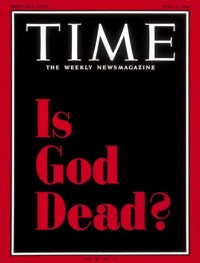
For atheists in the United States, the last five years feels like it could be the beginning of the end of Christian privilege. We have seen countless news reports of declining church attendance, particularly among younger Americans. At the same time, it is difficult not to be encouraged by the rise of atheism in the public consciousness. Fueled by the sales of a handful of books about atheism and the power of the Internet to expose teenagers to the content found on atheist blogs and websites, the sense of progress is unmistakable. And yet, I think that we are setting ourselves up for disappointment if we lose sight of the big picture provided by history.
Religion has been declared dead in America many times before, and it has reemerged each time. This Time cover from 1966 should remind us that religion ebbs and flows in our nation but never quite seems to disappear. Our neighbors have been determined to cling to their superstitions, and the big picture tells us that they will continue to do so.
I see at least two problems with how many of us think about the decline of religion. First, we are focusing on such a small window in time that we fail to see long-term trends. The last five years must be evaluated in the context of the last 50 if we are to accurately interpret them and appreciate what might be approaching on the horizon. Second, it is extremely difficult to operationally define just what it is that we want to measure and track over time. One of the most common markers of religiosity used by the scientists who conduct these studies is that of attendance of religious services. This may capture an important aspect of religiosity, but it misses spirituality and even god-belief. The truth of the matter is that there is no one perfect indicator of religiosity.
I am convinced that if we could examine data collected annually over the past 50 years on a variety of variables (e.g., god-belief, religious identification, church attendance, importance of religion in one's life, spirituality, intrinsic/extrinsic religiosity, etc.) that we would be in a far better position to understand the last five years and predict the next five. I expect that we would find that some variables have fluctuated a great deal, rising and falling like the tides. Others might fluctuate very little. More to the point, I have a feeling that the last five years would resemble other periods in time where it seemed like religion was on the way out before it returned with a vengeance.
I do not expect to see the end of Christian privilege in my life time, nor do I expect to live to see religion truly fade into the obscurity it deserves. Atheism will continue to have meaning and purpose long after I'm gone. And despite all of this, I think we can find reasons for optimism. Perhaps the Internet will help to hasten the demise of religion. And just maybe the peaks of religious influence in the next 50 years will be a bit shorter than they have been during the last 50.